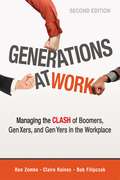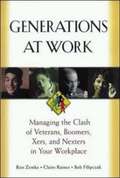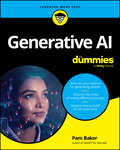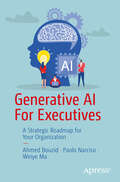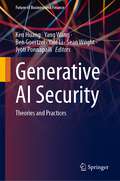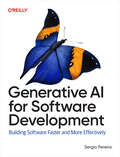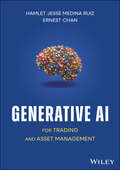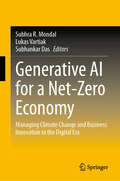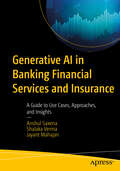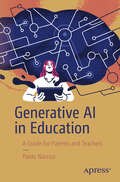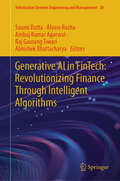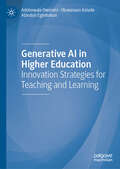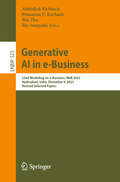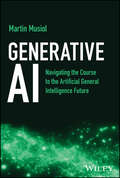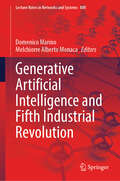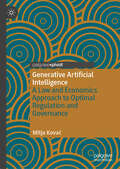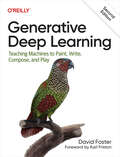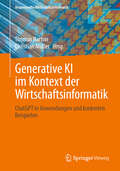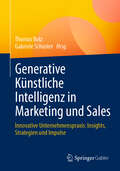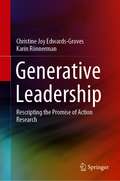- Table View
- List View
Generations at Work: Managing the Clash of Boomers, Gen Xers, and Gen Yers in the Workplace
by Ron Zemke Claire Raines Bob FilipczakWritten for those struggling to manage a workforce with incompatible ethics, values, and working styles, this book looks at the root causes of professional conflict and offers practical guidelines for navigating multigenerational differences.By exploring the most common causes of conflict--including the Me Generation&’s frustration with Gen Yers&’ constant desire for feedback and the challenges facing Gen Xers sandwiched between these polarities--Generations at Work offers practical, spot-on guidance for managing the differences with consideration to each generation&’s unique needs.Along with the authors&’ insights for managing a workforce with different ways of working, communicating, and thinking, this invaluable resources offers:in-depth interviews with members of each generation,tips on best practices from companies successfully bridging the generation gap,and a mentorship field guide to help you support the youngest members of your team.Generations at Work has the tools that are key to helping your workforce interact more positively with one another and thrive in today&’s wildly divergent workplace culture.
Generations at Work: Managing the Clash of Veterans, Boomers, Xers, and Nexters in Your Workplace
by Ron Zemke Claire Raines Bob FilipczakIn our age-diverse workplace of conflicting work ethics, dissimilar values, and idiosyncratic styles, this groundbreaking book supplies fresh, insightful strategies for understanding -- and overcoming -- generational differences.
Generations in the World of Work
by Corey Seemiller Meghan GraceGenerations in the World of Work provides invaluable data-informed insights into the intergenerational dynamics in today’s workplaces.Generational experts and authors of Generation Z: A Century in the Making, Corey Seemiller and Meghan Grace present the perceptions, motivations, and preferences of various generational cohorts and share how those shape individual behaviors, communication and collaboration, as well as wider organizational structures and norms. They offer guidance for how to maximize productivity and relationships to navigate dynamics across generational cohorts.Generations in the World of Work offers employees, managers, and organizational leaders guidance for maximizing productivity, relationships, wellbeing, and engagement across generational differences in order to create thriving workplaces that value and leverage each person’s strengths.
Generations of Economists (Routledge Studies In The History Of Economics Ser. #120)
by David CollardThis book focuses on the interaction between practising economists and previous generations of economists. Because economic problems, such as crashes, tend to recur and are only partially understood, it may be profitable read the work of previous generations in a collaborative spirit. Sometimes this can offer a different perspective on current preoccupations and cause us to reconsider the scope of our much criticised subject. The book gathers together earlier work by the author which appeared in various academic books and journals with the addition of six new chapters. The collection makes for a lively, informative and thought-provoking collection. It will interest anyone with an interest in the history of economics and of economic thought.
Generations, Inc.: From Boomers to Linksters--Managing the Friction Between Generations at Work
by Larry Johnson Meagan JohnsonNow that five different generations are on the job simultaneously--from Traditionals to Generation Y to Millennials--it's important for companies to understand how their people can not only coexist and cooperate, but thrive together as a team.Written by Meagan and Larry Johnson, a father-daughter team of two generational experts, Generations, Inc. offers the perspectives of people of different eras to elicit practical insights on wrestling with generational issues in the workplace.This book provides Baby Boomers and Linksters alike with practical techniques for:addressing conflicts,forging alliances with coworkers from other generations,getting people with different values and idiosyncratic styles to work together,and running productive meetings where all participants find value in each other&’s ideas.The generation we were born in influences our expectations, actions, and mind-sets.Generations, Inc. includes realistic strategies for relating to your team members&’ different views of loyalty, work ethic, and the definition of a job well done--and tips to make those perspectives work together to strengthen your workforce and grow your business.
Generative AI For Dummies
by Pam BakerGenerate a personal assistant with generative AI Generative AI tools capable of creating text, images, and even ideas seemingly out of thin air have exploded in popularity and sophistication. This valuable technology can assist in authoring short and long-form content, producing audio and video, serving as a research assistant, and tons of other professional and personal tasks. Generative AI For Dummies is your roadmap to using the world of artificial intelligence to enhance your personal and professional lives. You'll learn how to identify the best platforms for your needs and write the prompts that coax out the content you want. Written by the best-selling author of ChatGPT For Dummies, this book is the ideal place to start when you're ready to fully dive into the world of generative AI. Discover the best generative AI tools and learn how to use them for writing, designing, and beyond Write strong AI prompts so you can generate valuable output and save time Create AI-generated audio, video, and imagery Incorporate AI into your everyday tasks for enhanced productivity This book offers an easy-to-follow overview of the capabilities of generative AI and how to incorporate them into any job. It's perfect for anyone who wants to add AI know-how into their work.
Generative AI For Executives: A Strategic Roadmap for Your Organization
by Ahmed Bouzid Weiye Ma Paolo NarcisoIn the fast-evolving digital landscape, understanding the potential of generative AI is a strategic advantage. This book can serve as an easy to read introduction to the topic of the transformative power of AI in content creation, customer engagement, and operational efficiency. By deciphering complex AI concepts into practical insights, we empower decision-makers to envision innovative strategies, foster cross-industry collaborations, and navigate ethical considerations. The book will help executives and business decision makers to harness the immense potential of generative AI responsibly, ensuring data integrity and compliance while fostering a competitive edge. The book is focused on (1) Explaining in jargon-free language what Generative AI, and AI in general, (2) What problems they solve, and (3) What technologies make them possible.What You Will LearnHow generative AI models are built, how they generate new data or content, and the underlying algorithms powering these processesVarious practical applications of generative AI in business contextsThe challenges that could arise during the integration of generative AI into business processesWho This Book is ForThis book is meant to be bought and read by busy executives and business leaders
Generative AI Security: Theories and Practices (Future of Business and Finance)
by Sean Wright Ben Goertzel Yang Wang Ken Huang Yale Li Jyoti PonnapalliThis book explores the revolutionary intersection of Generative AI (GenAI) and cybersecurity. It presents a comprehensive guide that intertwines theories and practices, aiming to equip cybersecurity professionals, CISOs, AI researchers, developers, architects and college students with an understanding of GenAI’s profound impacts on cybersecurity. The scope of the book ranges from the foundations of GenAI, including underlying principles, advanced architectures, and cutting-edge research, to specific aspects of GenAI security such as data security, model security, application-level security, and the emerging fields of LLMOps and DevSecOps. It explores AI regulations around the globe, ethical considerations, the threat landscape, and privacy preservation. Further, it assesses the transformative potential of GenAI in reshaping the cybersecurity landscape, the ethical implications of using advanced models, and the innovative strategies required to secure GenAI applications. Lastly, the book presents an in-depth analysis of the security challenges and potential solutions specific to GenAI, and a forward-looking view of how it can redefine cybersecurity practices. By addressing these topics, it provides answers to questions on how to secure GenAI applications, as well as vital support with understanding and navigating the complex and ever-evolving regulatory environments, and how to build a resilient GenAI security program. The book offers actionable insights and hands-on resources for anyone engaged in the rapidly evolving world of GenAI and cybersecurity.
Generative AI for Software Development: Building Software Faster and More Effectively
by Sergio PereiraIn just a few short years, AI has transformed software development, and snazzy new tools continue to arrive, with no let-up in sight. How, as a software engineer, product builder, or CTO, do you keep up? This practical book is the result of Sergio Pereira's mission to test every AI tool he could find and provide practitioners with much-needed guidance through the commotion. Generative AI for Software Development focuses on AI tool comparisons, practical workflows, and real-world case studies, with each chapter encompassing critical evaluations of the tools, their use cases, and their limitations. While product reviews are always relevant, the book goes further and delivers to readers a coherent framework for evaluating the tools and workflows of the future, which will continue to complicate the work of software development. Learn how code generation and autocompletion assistants are reshaping the developer experience Discover a consistent method for rating code-generation tools based on real-world coding challenges Explore the GenAI tools transforming UI/UX design and frontend development Learn how AI is streamlining code reviews and bug detection Review tools that are simplifying software testing and QA Explore AI for documentation and technical writing Understand how modern LLMs have redefined what chatbots can do
Generative AI for Trading and Asset Management
by Ernest P. Chan Hamlet Jesse Medina RuizExpert guide on using AI to supercharge traders' productivity, optimize portfolios, and suggest new trading strategies Generative AI for Trading and Asset Management is an essential guide to understand how generative AI has emerged as a transformative force in the realm of asset management, particularly in the context of trading, due to its ability to analyze vast datasets, identify intricate patterns, and suggest complex trading strategies. Practically, this book explains how to utilize various types of AI: unsupervised learning, supervised learning, reinforcement learning, and large language models to suggest new trading strategies, manage risks, optimize trading strategies and portfolios, and generally improve the productivity of algorithmic and discretionary traders alike. These techniques converge into an algorithm to trade on the Federal Reserve chair's press conferences in real time. Written by Hamlet Medina, chief data scientist Criteo, and Ernie Chan, founder of QTS Capital Management and Predictnow.ai, this book explores topics including: How large language models and other machine learning techniques can improve productivity of algorithmic and discretionary traders from ideation, signal generations, backtesting, risk management, to portfolio optimization The pros and cons of tree-based models vs neural networks as they relate to financial applications. How regularization techniques can enhance out of sample performance Comprehensive exploration of the main families of explicit and implicit generative models for modeling high-dimensional data, including their advantages and limitations in model representation and training, sampling quality and speed, and representation learning. Techniques for combining and utilizing generative models to address data scarcity and enhance data augmentation for training ML models in financial applications like market simulations, sentiment analysis, risk management, and more. Application of generative AI models for processing fundamental data to develop trading signals. Exploration of efficient methods for deploying large models into production, highlighting techniques and strategies to enhance inference efficiency, such as model pruning, quantization, and knowledge distillation. Using existing LLMs to translate Federal Reserve Chair's speeches to text and generate trading signals. Generative AI for Trading and Asset Management earns a well-deserved spot on the bookshelves of all asset managers seeking to harness the ever-changing landscape of AI technologies to navigate financial markets.
Generative AI for a Net-Zero Economy: Managing Climate Change and Business Innovation in the Digital Era
by Subhankar Das Subhra R. Mondal Lukas VartiakThis book covers the technological aspects of Generative AI, its applications in achieving a net-zero carbon economy, the challenges of climate change, and the economic and management implications of these transitions. The book explores the transformative potential of Generative AI in driving the transition to a net-zero economy. It examines how this cutting-edge technology is revolutionizing climate change mitigation strategies and reshaping business models in the digital age. The book offers a comprehensive guide to leveraging AI for sustainable innovation through case studies, expert insights, and forward-thinking analysis. It addresses the challenges and opportunities in integrating AI into climate action plans, economic policies, and corporate strategies. Essential reading for policymakers, business leaders, and technologists, this book provides a roadmap for harnessing Generative AI to create a sustainable, prosperous future encompassing several key elements that align with the United Nations Sustainable Development Goals, in particular SDG 13: Climate Action.
Generative AI in Action (In Action)
by Amit BahreeGenerative AI can transform your business by streamlining the process of creating text, images, and code. This book will show you how to get in on the action!Generative AI in Action is the comprehensive and concrete guide to generative AI you&’ve been searching for. It introduces both AI&’s fundamental principles and its practical applications in an enterprise context—from generating text and images for product catalogs and marketing campaigns, to technical reporting, and even writing software. Inside, author Amit Bahree shares his experience leading Generative AI projects at Microsoft for nearly a decade, starting well before the current GPT revolution. Inside Generative AI in Action you will find: • A practical overview of of generative AI applications • Architectural patterns, integration guidance, and best practices for generative AI • The latest techniques like RAG, prompt engineering, and multi-modality • The challenges and risks of generative AI like hallucinations and jailbreaks • How to integrate generative AI into your business and IT strategy Generative AI in Action is full of real-world use cases for generative AI, showing you where and how to start integrating this powerful technology into your products and workflows. You&’ll benefit from tried-and-tested implementation advice, as well as application architectures to deploy GenAI in production at enterprise scale. About the technology In controlled environments, deep learning systems routinely surpass humans in reading comprehension, image recognition, and language understanding. Large Language Models (LLMs) can deliver similar results in text and image generation and predictive reasoning. Outside the lab, though, generative AI can both impress and fail spectacularly. So how do you get the results you want? Keep reading! About the book Generative AI in Action presents concrete examples, insights, and techniques for using LLMs and other modern AI technologies successfully and safely. In it, you&’ll find practical approaches for incorporating AI into marketing, software development, business report generation, data storytelling, and other typically-human tasks. You&’ll explore the emerging patterns for GenAI apps, master best practices for prompt engineering, and learn how to address hallucination, high operating costs, the rapid pace of change and other common problems. What's inside • Best practices for deploying Generative AI apps • Production-quality RAG • Adapting GenAI models to your specific domain About the reader For enterprise architects, developers, and data scientists interested in upgrading their architectures with generative AI. About the author Amit Bahree is Principal Group Product Manager for the Azure AI engineering team at Microsoft. The technical editor on this book was Wee Hyong Tok. Table of Contents Part 1 1 Introduction to generative AI 2 Introduction to large language models 3 Working through an API: Generating text 4 From pixels to pictures: Generating images 5 What else can AI generate? Part 2 6 Guide to prompt engineering 7 Retrieval-augmented generation: The secret weapon 8 Chatting with your data 9 Tailoring models with model adaptation and fine-tuning Part 3 10 Application architecture for generative AI apps 11 Scaling up: Best practices for production deployment 12 Evaluations and benchmarks 13 Guide to ethical GenAI: Principles, practices, and pitfalls A The book&’s GitHub repository B Responsible AI tools
Generative AI in Banking Financial Services and Insurance: A Guide to Use Cases, Approaches, and Insights
by Anshul Saxena Shalaka Verma Jayant MahajanThis book explores the integration of Generative AI within the Banking, Financial Services, and Insurance (BFSI) sector, elucidating its implications, applications, and the future landscape of BFSI. The first part delves into the origins and evolution of Generative AI, providing insights into its mechanics and applications within the BFSI context. It goes into the core technologies behind Generative AI, emphasizing their significance and practical applications. The second part explores how Generative AI intersects with core banking processes, ranging from transactional activities to customer support, credit assessment, and regulatory compliance. It focuses on the digital transformation driving investment banking into the future. It also discusses AI’s role in algorithmic trading, client interactions, and regulatory adaptations. It analyzes AI-driven techniques in portfolio management, customer-centric solutions, and the next-generation approach to financial planning and advisory matters. The third part equips you with a structured roadmap for AI adoption in BFSI, highlighting the steps and the challenges. It outlines clear steps to assist BFSI institutions in incorporating Generative AI into their operations. It also raises awareness about the moral implications associated with AI in the BFSI sector. By the end of this book you will understand Generative AI’s present and future role in the BFSI sector. What You Will Learn Know what Generative AI is and its applications in the BFSI sector Understand deep learning and its significance in generative models Analyze the AI-driven techniques in portfolio management and customer-centric solutions Know the future of investment banking and trading with AI Know the challenges of integrating AI into the BFSI sector Who This Book Is For Professionals in the BFSI and IT sectors, including system administrators and programmers
Generative AI in Education: A Guide for Parents and Teachers
by Paolo NarcisoAs artificial intelligence (AI) rapidly transforms education, tools like ChatGPT and Claude are revolutionizing the way we teach and learn. This book is a groundbreaking book that empowers parents and students to navigate this exciting new frontier, filling a critical gap in the current literature. As the first comprehensive guide to generative AI in education designed for parents and students, Generative AI in Education is positioned to become an indispensable resource. It provides the knowledge and strategies needed to effectively integrate AI into their learning journeys, transforming educational outcomes and preparing students for success in a rapidly changing world. You’ll gain a deep understanding of how tools like ChatGPT and Claude work, and how they can be leveraged to support learning across various subjects and grade levels. You’ll then see how to create clear, specific, and engaging prompts that elicit valuable responses from AI-powered tools. This book contains all the techniques for tailoring prompts to different learning objectives, styles, and contexts, and how they can use AI tools to support reading comprehension, writing skills, problem-solving, and creative thinking. What You Will Learn Apply generative AI in education Craft effective prompts for personalized learning experiences Utilize AI tools to support learning, creativity, and problem-solving Who This Book is For Parents and students who are eager to harness the power of generative AI to enhance learning experiences and prepare for success in an AI-driven future
Generative AI in FinTech: Revolutionizing Finance Through Intelligent Algorithms (Information Systems Engineering and Management #26)
by Álvaro Rocha Abhishek Bhattacharya Soumi Dutta Ambuj Kumar Agarwal Raj Gaurang TiwariThis book delves into the intersection of generative artificial intelligence (AI) and the financial Technology (FinTech) industry. This book provides a comprehensive exploration of how Generative AI, a cutting-edge subset of artificial intelligence, is fundamentally altering the landscape of finance. It meticulously unravels the intricate ways in which advanced algorithms, powered by generative AI, are transforming traditional financial processes, decision-making, risk assessment, portfolio management, fraud detection, and more. Through a detailed analysis of theoretical concepts and practical applications, we illustrate how generative AI techniques, such as Generative Adversarial Networks (GANs) and Variational Autoencoders (VAEs), are empowering FinTech applications to generate synthetic financial data, optimize trading strategies, and enhance customer experiences. Readers will gain a deep understanding of the potential of generative AI to create realistic financial scenarios, model market behaviour, and simulate various economic conditions for better planning and strategizing. Moreover, this book offers insights into ethical considerations and potential challenges associated with the use of generative AI in the FinTech domain, emphasizing the importance of responsible and accountable deployment. Additionally, Generative AI in FinTech serves as a practical guide for professionals, researchers, and enthusiasts seeking to implement generative AI solutions within the financial sector. It presents case studies and real-world examples that demonstrate the effectiveness and impact of generative AI in various FinTech applications.
Generative AI in Higher Education: Innovation Strategies for Teaching and Learning
by Abiodun Egbetokun Oluwaseun Kolade Adebowale OwoseniWith the integration of generative artificial intelligence (AI), teachers and learners now have access to powerful tools to enhance their productivity and effectiveness in their work. To meet the demands of this dynamic educational landscape, teachers must embrace AI to handle repetitive tasks, freeing them to focus on more intelligent and humanistic responsibilities. For learners, responsible use of AI could make learning more fun, personalized, flexible, and enriching. This insightful new book explores the evolving role of educators in higher education in a world of rapid technological advancements and provides a practical outline of the available technologies. By integrating Generative AI into teaching and learning, Higher Education Institutions can contribute to achieving inclusive and equitable quality education, a target of the UN Sustainable Development Goals, and promote lifelong learning opportunities for all. Generative AI can be used to enhance teaching and learning experiences, foster creativity, and develop new learning experiences in higher education. This book is a valuable resource for educators navigating the ever-changing landscape of education technology. With scientific background, practical insights and actionable tips, this book will be of interest to scholars of emerging technologies and innovation in education. It will also be of practical use to instructors seeking to harness the power of generative AI, enhancing productivity and transforming their approach to personalized learning.
Generative AI in e-Business: 22nd Workshop on e-Business, WeB 2023, Hyderabad, India, December 9, 2023, Revised Selected Papers (Lecture Notes in Business Information Processing #525)
by Bin Zhu Abhishek Kathuria Prasanna P. Karhade Ria SonpatkiThis book constitutes revised selected papers from the 22nd Workshop on e-Business, WeB 2023, which took place in Hyderabad, India, on December 9, 2023. The purpose of WeB is to provide a forum for researchers and practitioners to discuss findings, novel ideas, and lessons learned to address major challenges and map out the future directions for e-Business. The WeB 2023 theme was “Generative AI in e-Business”. The 13 full papers included in this volume were carefully reviewed and selected from a total of 46 submissions. They focus on both the transformative potential and the challenges of integrating generative AI into e-business models, paving the way for a future where AI empowers businesses and enriches lives.
Generative AI: Navigating the Course to the Artificial General Intelligence Future
by Martin MusiolAn engaging and essential discussion of generative artificial intelligence In Generative AI: Navigating the Course to the Artificial General Intelligence Future, celebrated author Martin Musiol—founder and CEO of generativeAI.net and GenAI Lead for Europe at Infosys—delivers an incisive and one-of-a-kind discussion of the current capabilities, future potential, and inner workings of generative artificial intelligence. In the book, you'll explore the short but eventful history of generative artificial intelligence, what it's achieved so far, and how it's likely to evolve in the future. You'll also get a peek at how emerging technologies are converging to create exciting new possibilities in the GenAI space. Musiol analyzes complex and foundational topics in generative AI, breaking them down into straightforward and easy-to-understand pieces. You'll also find: Bold predictions about the future emergence of Artificial General Intelligence via the merging of current AI models Fascinating explorations of the ethical implications of AI, its potential downsides, and the possible rewards Insightful commentary on Autonomous AI Agents and how AI assistants will become integral to daily life in professional and private contexts Perfect for anyone interested in the intersection of ethics, technology, business, and society—and for entrepreneurs looking to take advantage of this tech revolution—Generative AI offers an intuitive, comprehensive discussion of this fascinating new technology.
Generative Artificial Intelligence and Fifth Industrial Revolution (Lecture Notes in Networks and Systems #880)
by Domenico Marino Melchiorre Alberto MonacaIn this digital era, artificial intelligence (AI) is emerging as a catalyst for transformation across numerous fields, ranging from, economics, environment, finance to healthcare, AI's integration into daily operations and strategic planning presents a pivotal shift towards data-driven decision-making and automation. Each chapter in this volume addresses a unique aspect of AI, from theoretical frameworks and technological advancements to practical applications and ethical considerations. This volume not only highlights the advancements and applications of AI but also addresses the critical challenges of bias, privacy, and ethical implications associated with AI deployment. Through a multidisciplinary approach, it aims to provide readers with a nuanced understanding of AI's role in modern society and its potential to address some of the most pressing challenges of our times. As we stand on the brink of technological revolutions, this volume serves as a guide and a critical examination of the potential pathways AI might forge in the future. It is an essential read for academics, industry professionals, policymakers, and anyone interested in the profound changes AI is poised to bring. This is a multi-author book, but not a collection of essays. In fact, although signed by different authors, all the chapters of the book follow a line of development which is traced in the first part of the book and deepen the various aspects in logical order. The various parts of the book will explore the most important features of AI and analyse the implications of AI in Economics, Law, Policies, Smart Citizens and Territorial Aspects.
Generative Artificial Intelligence: A Law and Economics Approach to Optimal Regulation and Governance
by Mitja KovačThis book takes a comparative law and economics approach to explore the role of public and private actors in regulating generative artificial intelligence. The book provides an introduction and context for the creation of new generative AI technologies, now understood to be the chief goal of the leading AI companies. As autonomous ‘super-intelligences’, these technologies are still an unknown entity which nevertheless have profound implications for liberal democracy, consumer choice mechanisms, mutual trust, and political legitimacy. This book explores the deep challenges posed for lawmakers and how we can achieve an optimal form of regulation and governance of such unreliable technologies. Chapters investigate possible hybrid modes of regulation, such as a co-regulatory approach between private AI companies and public actors in addressing the issue of misinformation spread. It also explores mixed types of regulation toward research on new forms of AI, arguing that different levels of systemic risk posed by different technologies must be accounted for. Different contemporary and historical contexts for the regulation of unprecedented technical innovation are also considered, and new suggestions for policy are presented. This book is a timely resource which will be of interest to researchers and practitioners in economic governance, law and regulation, artificial intelligence, and comparative law.
Generative Deep Learning: Teaching Machines To Paint, Write, Compose, and Play
by David FosterGenerative AI is the hottest topic in tech. This practical book teaches machine learning engineers and data scientists how to use TensorFlow and Keras to create impressive generative deep learning models from scratch, including variational autoencoders (VAEs), generative adversarial networks (GANs), Transformers, normalizing flows, energy-based models, and denoising diffusion models.The book starts with the basics of deep learning and progresses to cutting-edge architectures. Through tips and tricks, you'll understand how to make your models learn more efficiently and become more creative.Discover how VAEs can change facial expressions in photosTrain GANs to generate images based on your own datasetBuild diffusion models to produce new varieties of flowersTrain your own GPT for text generationLearn how large language models like ChatGPT are trainedExplore state-of-the-art architectures such as StyleGAN2 and ViT-VQGANCompose polyphonic music using Transformers and MuseGANUnderstand how generative world models can solve reinforcement learning tasksDive into multimodal models such as DALL.E 2, Imagen, and Stable DiffusionThis book also explores the future of generative AI and how individuals and companies can proactively begin to leverage this remarkable new technology to create competitive advantage.
Generative KI als neues Teammitglied im Marketing: Ein Leitfaden für Marketingmanger:innen (essentials)
by Bernhard WeckeGenerative Künstliche Intelligenz bringt die digitale Transformation im Marketing auf eine neue Ebene und stellt Marketingverantwortliche vor unbekannte Herausforderungen. Erfahren Sie, wie sich die Rolle von Marketingmanager:innen in Zeiten von Generativer KI verändert und welche neuen Kompetenzen gefragt sind. Darüber hinaus gibt das Buch einen Überblick über die Auswirkungen von Generativer KI auf Marketingorganisationen und einen konkreten Leitfaden zu den Handlungsfeldern. .
Generative KI im Kontext der Wirtschaftsinformatik: ChatGPT in Anwendungen und konkreten Beispielen (Angewandte Wirtschaftsinformatik)
by Thomas Barton Christian MüllerGenerative KI stellt eine neue wichtige Technologie dar, die in der Lage ist, betriebliche Prozesse und Anwendungen zu automatisieren und zu optimieren. Inwieweit sich Generative KI wie ChatGPT für den Einsatz im Kontext der Wirtschaftsinformatik eignet, wird im Rahmen dieses Herausgeber-Bandes thematisiert. Dazu untersuchen einige Autoren-Teams den Einsatz von ChatGPT anhand verschiedener Beispiele. Die Beispiele umfassen sowohl Fragestellungen zum Lernen an der Hochschule wie zum Beispiel zur Texterstellung und zur Mathematik als auch zum betrieblichen Einsatz in der unternehmerischen Praxis in verschiedenen betriebswirtschaftlichen Anwendungsfeldern. Das Buch bietet wichtige Informationen, die für Praktiker ebenso relevant sind wie für Studierende und Lehrende.
Generative Künstliche Intelligenz in Marketing und Sales: Innovative Unternehmenspraxis: Insights, Strategien und Impulse
by Gabriele Schuster Thomas BolzDieses Buch beleuchtet die neuesten Entwicklungen in der Generativen KI und zeigt auf, wie Marketing und Vertrieb sie für sich nutzen können. KI verändert nicht nur einzelne Werkzeuge und Arbeitsweisen, sondern leitet einen grundlegenden Paradigmenwechsel in beiden Bereichen ein. Die Autor:innen bieten in ihren Beiträgen einen fundierten und umfassenden Einblick in aktuelle Anwendungsbereiche und Forschungsansätze zu Generativer KI im Marketing und Vertrieb. Thematisiert werden zahlreiche erfolgskritische Handlungsfelder, u. a. datenschutzrechtliche Herausforderungen, Social-Media- und Content-Marketing mit KI, Chatbots in der Employee-Journey, hyperpersonalisierte B2C-Kommunikation, KI-generierte Produkt- und SEO-Texte, bis hin zu Generativer KI in der Marketingforschung und die Rolle von KI in Start-ups. Das Werk richtet sich sowohl an Praktiker:innen und Entscheidungsträger:innen als auch an Forschende sowie Studierende und trägt dazu bei, das Verständnis für dieses dynamische und vielversprechende Feld zu vertiefen. Mit Beiträgen von: Prof. Dr. Petra Beenken Luise-Sophie Bleckmann Prof. Dr. Benny Björn Briesemeister Prof. Dr. Marc Ebel Susanne Fittkau Caroline Grauel Prof. Dr. Maik Günther Doris Hanway Prof. Dr. Claudia Heß Heiko Holz Isabel Hörmann Prof Dr. rer. pol. Kurt Jeschke Prof. Dr. Tobias Kesting Prof. Dr. Sonja Klose Prof. Dr. Ralf Kneuper Prof. Dr. Ralf T. Kreutzer Prof. Dr. Nicolai Krüger Prof. Dr. Sibylle Kunz Prof. Dr. Visieu Lac Christina Lagodka Prof. Dr. Alexander Lawall Prof. Dr. Damian Leschik Prof. Dr. Vera Lenz-Kesekamp Prof. Dr. Nikolaj Lunze Prof. Dr. Jan-Paul Lüdtke Elisabeth L’ Orange Sebastian Mertens Manuel Muth Prof. Dr. Gerd Nufer Prof. Dr. Miriam O’Shea Ban Pahlawan Florian Perst Marc Peter Prof. Dr. Jan Pieper Lavinia Celina Rahmawati Prof. Dr. Katharina-Maria Rehfeld Marie Salkowski Prof. Dr. Philipp Schmid Annkristin Schürhaus Freddy Sikouonmeu Neal Wessling Prof. Dr. Klaus Wildhirt Prof. Dr. Atilla Wohllebe Cansu Rosa Yildirim Prof. Dr. Tanja Marlen Zweigle
Generative Leadership: Rescripting the Promise of Action Research (Springerbriefs In Education Ser.)
by Karin Rönnerman Christine Joy Edwards-GrovesThis book is about the generative nature of leading practices when teachers, as learners, participate in long term action research projects for the purpose of professional development. This book also shows how practices of professional learning and practices of leading can be understood as related (and developed) in ecologies of practices; the authors show how these are explicitly connected. These findings direct readers to the connectivity between professional learning and leading practices that over time - after participating in long term action research programs - emerged as ‘significant’ yet ‘unexpected’ outcomes.
